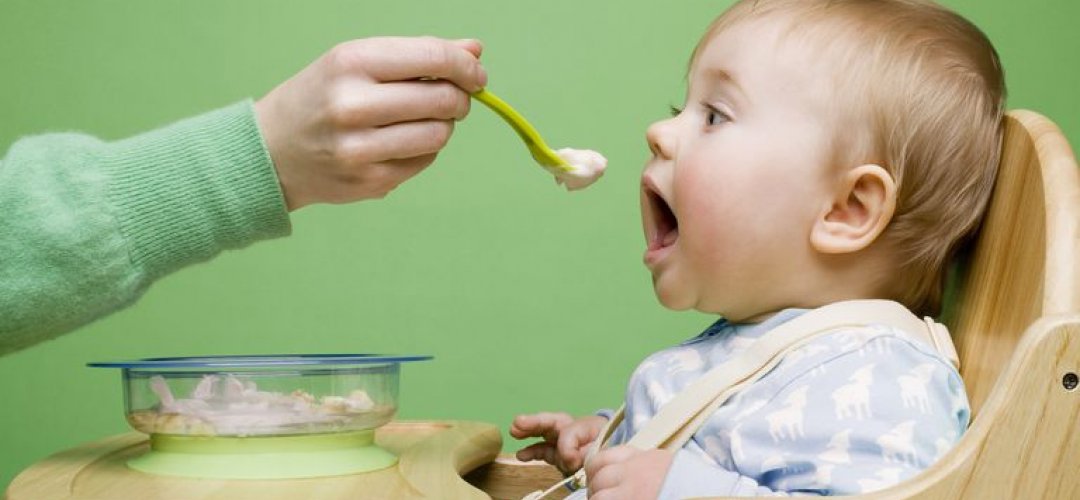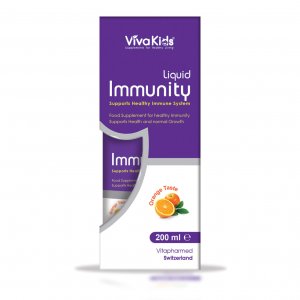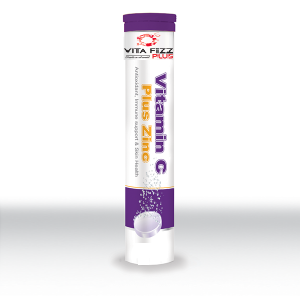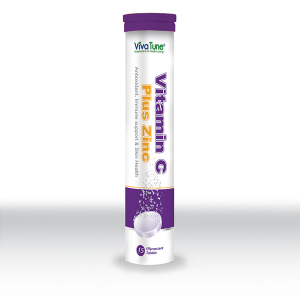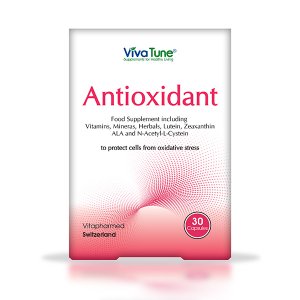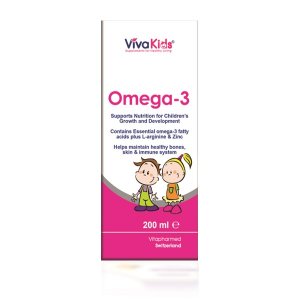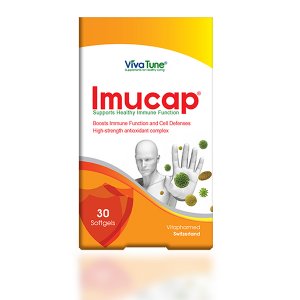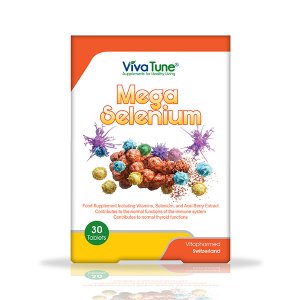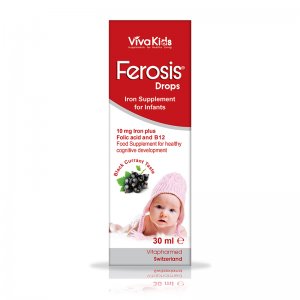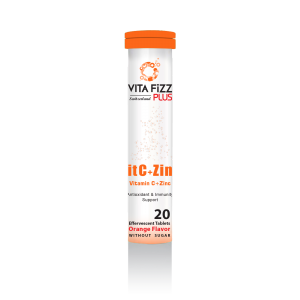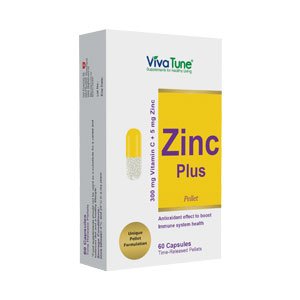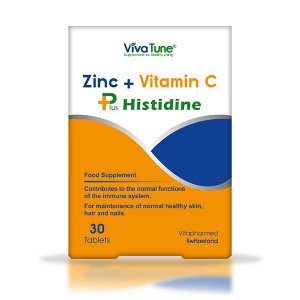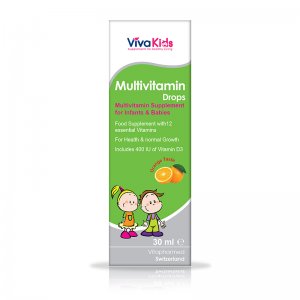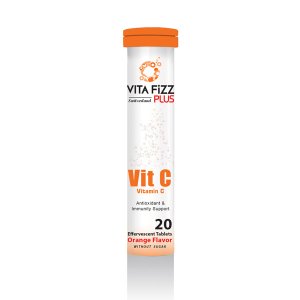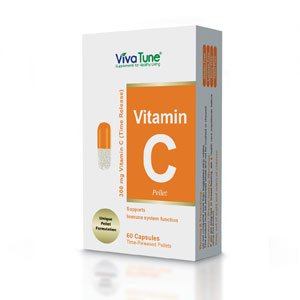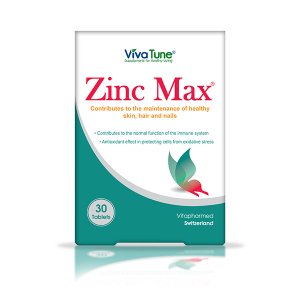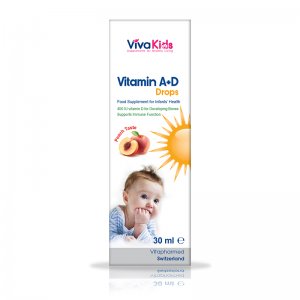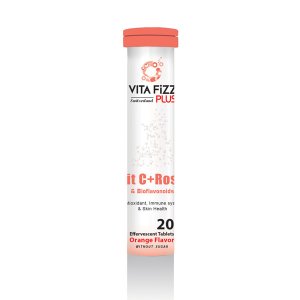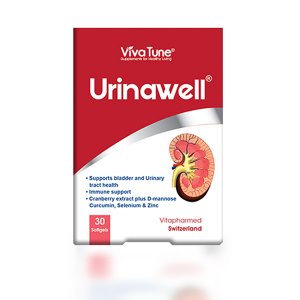What are the best natural immune boosters for kids? Learn how to support your child’s immune system without taking daily supplements.
There’s nothing that can tug at your heartstrings quite like a baby fever or your little one’s chronic earache. But is there anything you can do to prevent these things? Like it or not, our babies are going to get sick sometimes (it’s actually good for their immune systems—more on that below!), but thankfully, there are some natural immune boosters for kids that may help decrease the frequency and severity of sickness.
Let’s break it all down below, including:
- How our immune systems evolve
- Signs of a weak immune system
- The best natural immune boosters for kids
- Plus, why you shouldn’t take immune stimulants regularly
When Do Babies Develop Their Own Immune System?
Have you ever wondered why babies—so little and fragile—aren’t born with rock-solid immune systems ready to tackle the world? When a baby is in the womb, the immune system must “back down,” so that baby can tolerate the mother’s cells. Once baby enters the world and is no longer relying on mama to sustain him/her, their immune systems must grow and evolve from scratch.
How breastfeeding helps boost baby’s immune system
Although the immune system is weak at birth, breastfeeding plays a major role in the early development of the immune system. When baby drinks mama’s milk, he/she receives:
- Helpful IgA antibodies
- Anti-idiotypic antibodies
- Growth factors
- T and B lymphocytes
- Helpful or “good” bacteria, such as bactericidal lactoferrin
All of the above are special nutrients in human milk that help to boost baby’s immune system.
How the immune system continues to grow
The immune system continues to evolve throughout early childhood through:
Outdoor playtime: When children play outside (especially in dirt), their immune systems get a little boost. Unfortunately, as outdoor playtime decrease in our society, kids are not getting enough of the “good” bacteria from dirt. Did you know kids who grow up on farms and are always outside tend to have stronger immune systems, less allergies, and less asthma?!
Coming into contact with germs: Studies show that children exposed to other children (e.g. in a daycare or playdate setting), have stronger immune systems.
Getting sick: It’s so sad to see your little one feel under the weather, and although it sounds backwards, colds and other minor illnesses are one of the best natural immune boosters for kids. Every time your child catches a cold, their body creates antibodies that help their bodies learn how to fight illnesses and infections. In fact, a 2018 study revealed that children who caught many colds when they were two had 33 percent less colds when they were in elementary school.
Signs Your Child Has a Weak Immune System
If it seems like your child is always catching a cold, don’t panic. Kids’ immune systems are still developing, and because of that, they are more susceptible to colds and infections. There are many factors (like those above) that influence how quickly your child’s immune system develops.
That said, you may suspect your child could use some natural immune boosters for kids if s/he:
- Is frequently sick
- Is sick for long periods of time, or seems to take longer than others to kick colds
- Has difficult gaining weight, or is underweight
- Has back-to-back thrush infections
Tip: If your child has more than eight ear infections in a year, more than two severe sinus infections in a year, or is struggling to gain weight, it may be worth a trip to the pediatrician to rule out a serious, but rare, condition called Primary Immune Deficiency.
Get free updates on based on your toddler’s birth date!
Natural Immune Boosters for Kids
The good news is that there are many natural immune boosters for kids that can help decrease the frequency and severity of illness:
Get plenty of sleep
Sleep is one of the most powerful natural immune boosters for kids (and adults!). During sleep, your body takes time to repair itself, but it also takes that precious time to produce infection-fighting white blood cells. In fact, a 2007 animal study found that a lack of sleep caused the body’s white blood cell counts to dip, and without those white blood cells, you are at risk for getting sick.
The solution? Make sure your little ones are getting enough sleep. Not sure how much sleep your child needs? Check out Mama Natural’s sleep chart here.
Exercise regularly
We know exercise is good for so many reasons, but did you know it’s one of the best natural immune boosters for kids? Exercise can reduce colds by up to 67 percent In a 2008 study, researchers noted that individuals who exercised were less likely to develop an upper respiratory infection, and even if they did catch a cold, those colds were less severe and shorter in duration.
There are many ways to use exercise as a natural immune booster for kids:
- Visit the park—even in the fall and winter months!
- Take family walks.
- Play frisbee, tag, or T-ball in the yard.
- Park in the furthest parking spot when shopping to encourage your child to walk more.
- Try mommy and me swimming or yoga classes.
Take antibiotics only when necessary
While there is a time and place for antibiotics, overusing antibiotics can cause antibodies to become resistant to the medicine.
In order to help antibiotics remain effective (for when you really need them), try following these tips:
- Never use antibiotics for a viral infection, because viruses are simply not affected by the antibiotics.
- Avoid antibacterial soaps or antibacterial hand sanitizer, because these soaps can contribute to the development of antibiotic-resistant bacteria.
If antibiotics are medically necessary, you can rebuild your child’s gut health by making sure they get probiotics—take them at least two hours after the antibiotics.
Boost up zinc levels
A 2008 study found that zinc deficiency actually contributed to immune dysfunction. That’s because zinc helps the body produce T cells, which are part of the immune system.
Copper and zinc are antagonists and kids tend to eat copper-rich foods like chocolate, whole grains, and potatoes and skimp on zinc-rich foods like oysters, shellfish, and red meat.
Work to incorporate foods high in zinc regularly like:
- Chickpeas: You can make an easy-to-eat hummus for younger children.
- Seeds: Pumpkin, hemp, and sesame seeds
- Cashews, including cashew butter or cashew milk
- Eggs: for a protein-rich breakfast
- Ground red meat: in spaghetti or burgers
Get plenty of phytonutrients
Phytonutrients are compounds that are naturally present in plants (including fruits and vegetables) that serve as the plant’s own defense against illness. Phytonutrients strengthen the plant’s immune system by defending it against bacteria, viruses, and free radicals. When you consume these phytonutrients, your immune system benefits for the same reasons. You may recognize phytonutrients by their specific names: lycopene and carotenoids are two common ones.
You can find phytonutrients in:
- Tomatoes (Cooking tomatoes actually concentrates the phytonutrients!)
- Camu camu powder
- Green vegetables like broccoli and spinach. Or try this tropical smoothie.
- Onions and garlic
- Carrots
- Fresh herbs like parsley, cilantro, and basil (Try this pesto!)
Take probiotics
Probiotics are one of the best natural immune boosters for kids, because you are literally arming your immune system with good bacteria. Probiotics consist of live cultures that become part of your gut microbiome. How does this affect your immune system?
Ninety percent of your body’s immune system resides in your gut, so when you supply the necessarily live cultures to your gut, you support your immune system.
Babies and older children can both benefit from probiotics—here are some of my favorite probiotics for kids and babies. You can also eat probiotic-rich food like yogurt.
Some kids with leaky gut benefit from this Restore product.
Get lots of vitamin D
You probably know that vitamin D plays a vital role in bone health, but according to a 2011 study, vitamin D also supports the immune system. Specifically, vitamin D encourages an immune response when the body is threatened with foreign invaders.
The best sources of vitamin D:
Sunshine is the best source of vitamin D, but if you live in cloudy/rainy climates, you may get enough natural sunshine.
Vitamin D drops are often suggested for breastfeeding babies, and mom can supplement at 6,400 IU per day to give baby what he/she needs through the breast milk. Consider a vitamin D/K blend so that your minerals stay in balance.
Vitamin D-rich foods, like fatty fish (salmon and mackerel), eggs, grass-fed beef, and egg yolks.
Eat vitamin A-rich foods
Vitamin A is another vitamin that can boost your immune health. In a 2015 animal study, researchers found that this vitamin played a specific role by protecting respiratory health. Vitamin A deficiency compromised the “immunity of the airways.” Considering the airways are one of the first places that your body comes into contact with invading germs, it’s a good idea to make sure your child receives adequate levels of this vitamin.
Look for vitamin A-rich foods such as:
- Liver
- Egg yolks
- Pasteurized butter
- Cod liver oil which also contains vitamin D and K!
Use a saline rinse or neti pot
A neti pot can help your immune system by flushing mucous from your nasal passages and cleaning out harmful bacteria from your sinuses. Best to do when sick or very congested but not daily as you don’t want to disrupt sinus microbiome.
Here’s what to do:
- Fill your neti pot with salt water (with distilled, or boiled and cooled, water)
- Have your child tilt his head sideways
- Instruct him to lean over the sink
- Insert the spout of the pot into the nostril that is higher
- Remind your child to breath with his mouth—not his nose
- Tilt the pot so that the water follows through the nostril and out through the bottom nostril
If your child isn’t interested in the neti pot (many kids won’t be!), you can use a saline spray too.
Another option is using the Restore nasal spray to help build up your sinus microbiome and strengthen the immune system. Xlear works similarly.
Drink plenty of spring water
Staying properly hydrated assists your immune system in many ways. In fact, drinking enough good, clean water (Spring water is ideal) is one of the best natural immune boosters for kids. Hydrating helps your body fight off colds and flush out bacteria in your urine, which can reduce your child’s risk of developing a urinary tract infection.
To make water more appealing to children, add:
- lemon slices,
- strawberry slices,
- or pineapple and mint leaves.
And don’t forget, there are lots of fruits and vegetables with very high water content. See a comprehensive list in this post.
Maintain good oral health
Believe it or not, your oral health can affect your overall health. Studies show that oral infections can increase your risk of autoimmune diseases That’s because your mouth is another part of your microbiome (and so is your skin, sinuses, genitals, etc.)
Here’s how to ensure your kids have good oral health:
- Help your child brush his teeth until he is around eight years old
- Brush twice a day for two full minutes
- Floss daily
- Schedule regular check-ups with your holistic dentist. Find a holistic dentist here.
Tips for incorporating massage into your daily routine:
Massage your child as part of their bedtime routine: Use a lavender-scented lotion for an extra relaxing touch
Massage your baby after a warm bath
Play peaceful music and take the opportunity to bond with your baby
Spend time outside
“There’s no such thing as bad weather, only bad clothes” – Norwegian Proverb
Many parents worry about taking kids outside in the winter months, but the truth is that getting outside won’t cause you to catch a cold. In fact, in many Scandinavian countries, parents let their babies nap outdoors during the winter months—they believe it’s one of the best natural immune boosters for kids.
Try forest bathing—spend time taking in nature, breathing in the fresh air, and peacefully immersing yourself in your surroundings. When done mindfully, forest bathing and spending time in nature can actually increase the NK cells (the cells that destroy invading viruses and bacteria) that boost your immune system.
Get a pet
If you’ve been on the fence about getting a pet, now is your chance! Studies show that sharing your home with a pet can improve your immune system and reduce your chance of developing allergies or asthma.
Here are the stats:
Petting a dog for just 18 minutes stimulates IgA production
Newborns who share a home with a cat have a decreased risk of asthma
Animals reduce stress levels (and stress can sabotage your immune system)
Start a garden
Remember earlier when we mentioned that children who played in the dirt had stronger immune systems? Well, you don’t have to miss out on that benefit if you don’t live on a farm!
Try:
Window boxes
Indoor herb gardens
Small outdoor plots for sewing easy-to-grow herbs
Keep sugar to a minimum
Refined sugar is so tough on the body:
Bacteria thrive on the acidic environment of refined sugar. (That’s why sugar contributes to tooth decay
Too much sugar can also wreak havoc on your gut health, and that is bad for your immune system because your gut houses much of your immune system.
Sugar also leads to inflammation throughout the body.
For these reasons, it’s a good idea to avoid processed sugar. If the kids want something sweet now and then (who doesn’t?), try one of these desserts: paleo pumpkin bites, grain-free pecan pie, or mini chocolate bundt cakes.
Try reishi
Studies show that reishi and other mushroom blends enhance the natural immune system and help the body fend off “bad bacteria” and germs. In fact, reishi has even been shown to increase the white blood cells that fight cancer
The reishi mushroom can be eaten fresh, but it’s also widely available in powdered form. For kids, try this delicious reishi mushroom hot chocolate.
What About Immune Stimulants?
I know what you’re thinking—isn’t elderberry syrup one of the best natural immune boosters for kids?!
But before we discuss elderberry syrup, let’s back up a second, and discuss immune stimulants. Immune stimulants are substances (both chemical and natural) that stimulate, or encourage, the immune system to take action.
Immune stimulants are different from substances that support the immune system; rather than strengthening the immune system, the immune stimulants tell the immune system to act.
Some say elderberry syrup and echinacea are immune stimulants. Although elderberry syrup reduces the severity and duration of colds . you may want to save it for times when your child gets sick to avoid potentially sending your immune system into overdrive.
What About Daily Vitamins?
It’s best to receive as many nutrients as possible from food sources. Multivitamins, if used in abundance, can cause mineral imbalances.
In a large study conducted by doctors from John Hopkins University, researchers discovered that multivitamins do not reduce the risk of contracting certain diseases. In fact, vitamins can cause damage by delivering too much of certain vitamins.
Also, children get a lot of nutrients per pound of body weight, if they’re eating a relatively healthy diet. An average toddler eats 1,000-1,500 calories a day, which is as much as some small adults! Most kids don’t need extra vitamins.
If your child eats a nutrient-poor diet
If you want to fortify a bad diet, try natural food-based items like:
- Camu camu powder for vitamin C
- Cod liver oil for fat soluble vitamins A, D, and K
- Kelp powder for trace minerals, including iodine
- 1 Brazil nut for selenium
- Red meat 2X per week for zinc or one of these zinc lozenges a few times per week
- Probiotics to boost immunity
- 4 oz. of coconut water per day for potassium
- 1 tsp. of bee pollen for B vitamins, assuming your child isn’t allergic to bee stings!
Bottom line: Usually multivitamins aren’t needed as natural immune boosters for kids. However, if your child does have a true deficiency, speak with your child’s healthcare provider about any supplement needs.
Remember…
At the end of the day, don’t fret if your child gets a cold. It can be hard to watch your child feel yucky, but remember to take the opportunity to give them extra snuggles and TLC. And the silver lining: Getting colds can help your child build up their immune system.
How About You?
What do you think are the best natural immune boosters for kids? I’d love to hear about what has (and hasn’t) worked for you!
